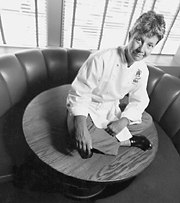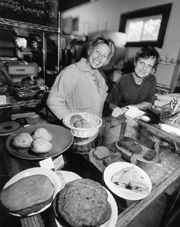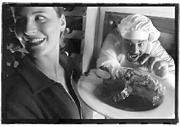JUDGING FROM THE number of queries I get about the nature of my jobeverything from “Whats it like to be a restaurant critic?” (from folks I meet) to “What qualifies you to do it?” (from pissed-off restaurateurs)it seems theres a fair amount of mystery associated with the profession. Herewith, a little explication.
In answer to everybodys first question, yesrestaurant criticism is the best job on the planet. You get to go to the newest places and the old standards at no cost to yourself (the newspaper pays). Lots of restaurants with particularly effervescent public relations departments issue complimentary invitations to restaurant critics, and if these are welcomed by other newspapers they never are by us. As we used to say about The Best Places guidebooks, you cant buy your way in…and you cant buy your way out.
My particular training for the job came via The Best Places, where I began my professional career as an intern 16 years ago. In the process of working my way up to editor of the series I dined with and traveled with and edited literally dozens of regional reviewers, of varying ethnic backgrounds and palates, and in time I learned a few of their tricks. I learned that to ensure the best review everyone at the table ought to order something different, and that someone should order the special (its usually the best showcase for the chefs gifts), and that flavor and texture are critical but incomplete elements of a restaurant review.
Is the plate pretty? Are the chairs comfortable? Is the server more in evidence than is useful? Less? What these and a million more little details all add up to is nothing more than simple observation, which turns out to be the number-one requirement for the restaurant critic. This is all toward a single standard: Is the restaurant successfully doing what it has set out to do? Many assume I must be (or should be) a great cook in order to do this job, and no, Im merely an okay cook; more than conversant with the lavish spectrum of problems that can beset the best-laid table, and, as such, humbly and deeply cognizant of the difficulty of getting six different delicious hot dinners to a given table at the same time.
Fair critics need always keep that difficulty in mind, right alongside the everpresent image of the diner who will be relying on her words to make an informed consumer choice. As a critic, that diner is who youre working for. This can be tempting to forget when dining for the third time in a row at an earnest little joint run by the worlds nicest mom and pop serving truly horrible food, because all you want to do in such a case is gloss over that last little fact in favor of what seems an otherwise deserving operation. Principled restaurant critics never let themselves do that. The Hippocratic Oath of our profession mandates truth, truth, and more truthno matter how painful.
Ive had some dark nights of the soul over this one, particularly when the worlds nicest mom and pop have called me on the phone to ask in halting English why I chose to send them back to their homeland. Ill never forget the day years ago when a restaurateur stormed into Seattle Weeklys lobby on his places last day of business demanding to see me: “You,” he bellowed, purple with rage, “You closed my restaurant!”
In fact, over several years of writing about his restaurant I had merely pointed out a few extremely visible enhancement opportunitiesa practice which was not particularly commonplace in Seattle at the time. That was when the best-known critic in town, a famously nice guy, had sworn off of negative reviews altogether; if he encountered a bad experience he simply wouldnt write about it.
Aside from squandering his newspapers resources, this guy wasnt fully serving his readers. (For my part, the only time I wont write about a restaurant is when I become physically ill after eating there. Dicey situation, this. And its happened to me more than once; I used to edit the book Seattle Cheap Eats.)
But I admit that deep down I understand that critics reticence. Aggrieved restaurateurs complaints notwithstanding, negative reviews in alternative weeklies of this papers size are not likely to destroy establishments the way they can in metropolitan dailies. New York Times critics Brian Miller and Ruth Reichl have been known to close establishments down with a single review. As far as I know, Seattle Weekly, despite my own delusions of influence, has yet to accomplish such a feat. (And probably wontunless I start writing about the places that made me sick.)
NOR, TO MY knowledge, have Seattle Weeklys various restaurant critics ever had to don disguises, another classic practice at The New York Times. I always make anonymous visits, reserving under other peoples names, and suffer very little fear that hosts are consulting long lists of aliases and family names of the sort that New York restaurants reportedly keep by their phones regarding current critic Ruth Reichl.
One former colleague who now reviews restaurants for a large metropolitan daily carefully rehearses pseudo chit-chat with her dining companions before they enter any restaurant; this faux conversation, generic as possible, is to be turned on as waiters and busers approach in lieu of the real talk which might reveal their identities.
All of this is a little too cloak-and-dagger for me to pull off without feeling altogether ridiculous; thankfully in little old Seattle Ive not yet seen the need. My credit card has my name on it, which I never produce til the meals been consumed anyway. (Only once has a restaurateur approached to ask if I was the Kathryn Robinson, which made me feel big and important for the whole rest of the evening. Hasnt happened since. Like I said, delusions of influence.)
I take notes on my lap as surreptitiously as possible, but I was busted once by a waiter with no shortage of assertiveness who cracked, “Whaddya doing, taking notes?” “Just balancing my checkbook,” I blurted, idiotically, reminding myself of the old Best Places colleague who was asked point-blank by a waiter what was that little machine he was talking into. (This ended our infatuation with tape-recorded notetaking.) “Its a hearing aid,” my colleague replied, thinking fast. “Would you mind describing all of the menu items and their primary ingredients directly into this mouthpiece?”
AND UNDER THE dirty-job-but-someone-has-to-do-it category lies the fact (which I realize sometime in the midst of every review) that eating professionally isnt always a bed of roses. Your friends are yukking it up and swilling it down; you are concentrating and taking notes and generally keeping your wits about you. (Critics need their senses to be unimpeded, so we cant have the sniffles or wear perfume or drink more than a glass or two of wine.)
No matter how interesting or uninteresting the place, I visit at least twice; any place can have an off night. If I leave the second visit without having formed a single general opinion, I schlep back for a third visit. My job, after all, is to leave the reader with my determinationnot just of the quality of each individual dish, but what all that plus service plus ambition plus decor plus that overall ineffable tone called atmosphere adds up to.
Sometimes what I think of a place becomes an easy call; like, say, if the waiter shoots champagne all over me and then screams “FUCK!” (This happened once.) Sometimes its a subtler thing. But if at the end of a restaurant review you, the reader, dont know if its a place you want to dine in with your lover, your boss, your two-year-oldor at allI havent done my job.







